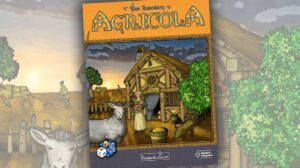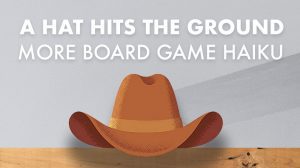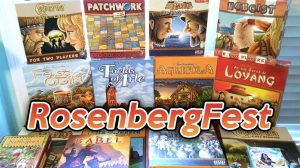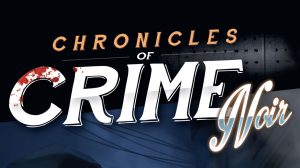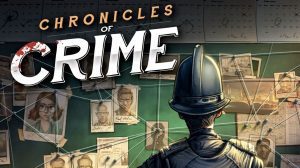Description from BoardgameNews
In Agricola, you're a farmer in a wooden shack with your spouse and little else. On a turn, you get to take only two actions, one for you and one for the spouse, from all the possibilities you'll find on a farm: collecting clay, wood, or stone; building fences; and so on. You might think about having kids in order to get more work accomplished, but first you need to expand your house. And what are you going to feed all the little rugrats?
The game supports many levels of complexity, mainly through the use (or non-use) of two of its main types of cards, Minor Improvements and Occupations. In the beginner's version (called the Family Variant in the U.S. release), these cards are not used at all. For advanced play, the U.S. release includes three levels of both types of cards; Basic (E-deck), Interactive (I-deck), and Complex (K-deck), and the rulebook encourages players to experiment with the various decks and mixtures thereof. Aftermarket decks such as the Z-Deck and the L-Deck also exist.
Agricola is a turn-based game. There are 14 game rounds occurring in 6 stages, with a Harvest at the end of each stage (after Rounds 4, 7, 9, 11, 13, and 14).
Each player starts with two playing tokens (farmer and spouse) and thus can take two turns, or actions, per round. There are multiple options, and while the game progresses, you'll have more and more: first thing in a round, a new action card is flipped over.
Problem: Each action can be taken by only one player each round, so it's important to do some things with high preference.
Each player also starts with a hand of 7 Occupation cards (of more than 160 total) and 7 Minor Improvement cards (of more than 140 total) that he/she may use during the game if they fit in his/her strategy. Speaking of which, there are countless strategies, some depending on your card hand. Sometimes it's a good choice to stay on course, and sometimes it is better to react to your opponents' actions.
A look at @Tom's first, and still favorite, worker placement/resource gathering game. Agricola, from Uwe Rosenberg.
Maryland has a small convention named Congress of Gamers. It's a good convention, so it seemed a good idea to learn something from the man behind the con. Join...
Join Meeple Mountain as we sound off on the language the hobby uses to discuss complexity in games. We’re going deep to discuss this weighty matter!
The team suggests 6 games in need of a deluxified re-release!
Tabletop game themes across the hobby are increasingly diverse, but there’s one area that’s conspicuous in its absence. Join Meeple Mountain as we ask - where...
Meeple Mountain is proud to present another collection of board game haiku, exploring ideas and thoughts about board games in seventeen syllables.
The idea: try to plow through 17 Uwe Rosenberg games in a single 3-day weekend. Was I successful or was I too ambitious? Read on to find out!
Have you ever had to try to describe a game in a single phrase? Here’s a satirical look at some honest game descriptions of our favorite (or least favorite)...
Join Meeple Mountain as we welcome Richard Breese, founder of R&D Games, to the interview table!



